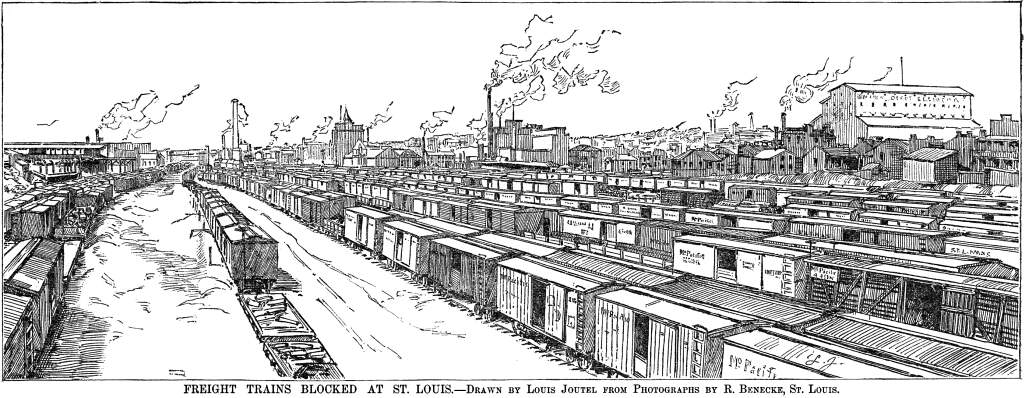THE SOUTHWESTERN RAILROAD STRIKE
Harper's Weekly—April 3, 1886

THERE is a less clearly defined purpose in the strike of the
Knights of Labor employed by the Southwestern railroads than in
any other of recent years. Early in March a stake was ordered
by the Knights of Labor of certain employees of the Texas and
Pacific Railroad Company, because a foreman had been dismissed,
it was claimed, contrary to an agreement between the railway company
and the organization to which he belonged. The receiver of the
railroad refused to reemploy the dismissed man, and the Knights
of Labor thereupon ordered a strike, first of the men employed
in the shops of the Missouri Pacific Company, and then of other
employees who were members of the organization. This was in effect
a boycott, the purpose of the strikers being to compel the receiver
of the Texas and Pacific road to reemploy the dismissed Knight
by obstructing traffic oil connecting roads. Mr. H. M. Hoxie,
Vice-President of the Missouri Pacific Company, at once informed
a committee of the strikers that the Texas road was not in any
way under his jurisdiction, and that he had no power to cause
the reinstatement of the dismissed foreman. Meanwhile, all freight
trains on the "GOULD system"
of roads, which centres at St. Louis, were stopped, and the greatest
blockade of traffic has followed that has been known since the
blockade caused by the general strike of railroad employees in
1877. Mr. HOXIE published a statement to
the public, in which lie claimed that the employees of the roads
over which his authority extended had made no complaint, and had
no cause to make complaint, and that the blockade of traffic was
caused with. out provocation by the management of the Missouri
Pacific Company.
In reply to that, committees of the Knights of Labor have published
addresses to the public, to the business men of St. Louis and
to all organizations of working-men, in which they set forth that
the managers of the "GOULD system"
of roads have violated in a succession of instances an agreement
entered into in 1884 between the companies and the Knights about
increase of pay of certain employees, and the conditions on which
men should be dismissed. To these ex post facto explanations the
managers of the blockaded railways have not replied. But the Governors
of Missouri and Kansas met at St. Louis, held a conference with
Mr. HOXIE and at a subsequent conference
with a committee of the Knights made an effort to effect a reconciliation.
But the Knights refused to return to work without assurance that
greater consideration would be given them than hitherto by the
managers of the roads. They issued an address refusing to return
to work unless a new agreement should be made defining in particular
the influence that would be given to their decision concerning
the dismissal of men from the service, and threatening a general
trial of strength between the Knights and the railroad companies,
not only of the GOULD system, but all its
connections eastward and southward. Another address issued by
the strikers on the 24th declared that reconciliation was impossible
unless more substantial recognition should be given to the Knights
of Labor. Mr. T. V. POWDERLY, the chief
executive officer of the organization, oil the same day wrote
to ex-Governor CURTIN, member of Congress
from Pennsylvania, asking for Congressional investigation of the
strike and its causes.
For eighteen days the blockade was maintained without other
deeds of violence at St. Louis than preventing of freight trains
from moving. The Governors of Missouri, Kansas, Arkansas, and
Texas issued proclamations on the 20th, calling on the managers
of the roads to send out their trains as usual, and on all officers
of the law to afford them protection. The railroad company made
efforts daily to send out trains, but the strikers disabled the
engines, uncoupled the ears, and otherwise prevented a resumption
of traffic. The number of men out of employment is not less than
10,000, and the loss to the railroads and to owners of freight
is incalculable. The effect of the blockade is felt from one side
of the continent to the other.
Strike Page
| Contents Page
|







